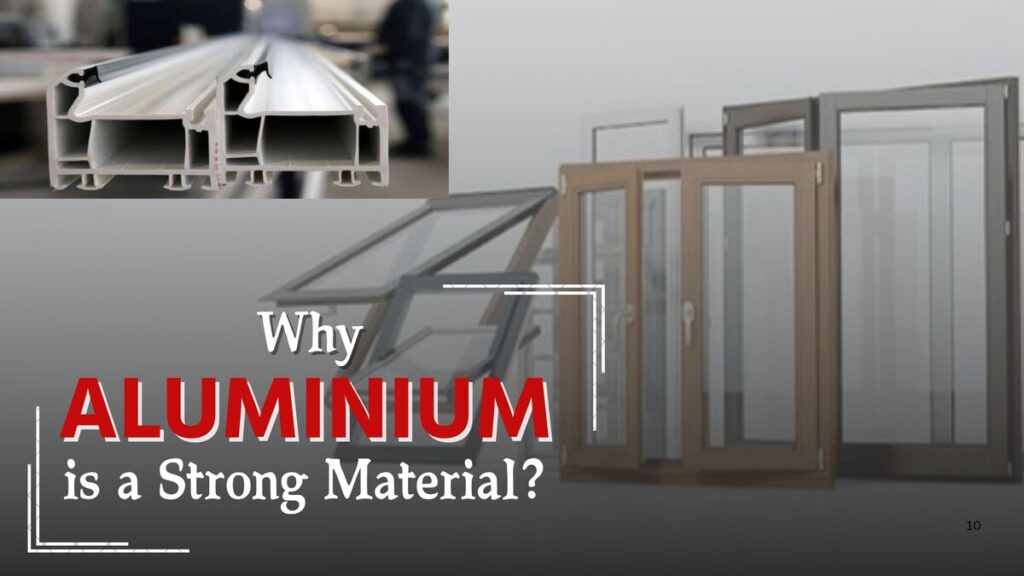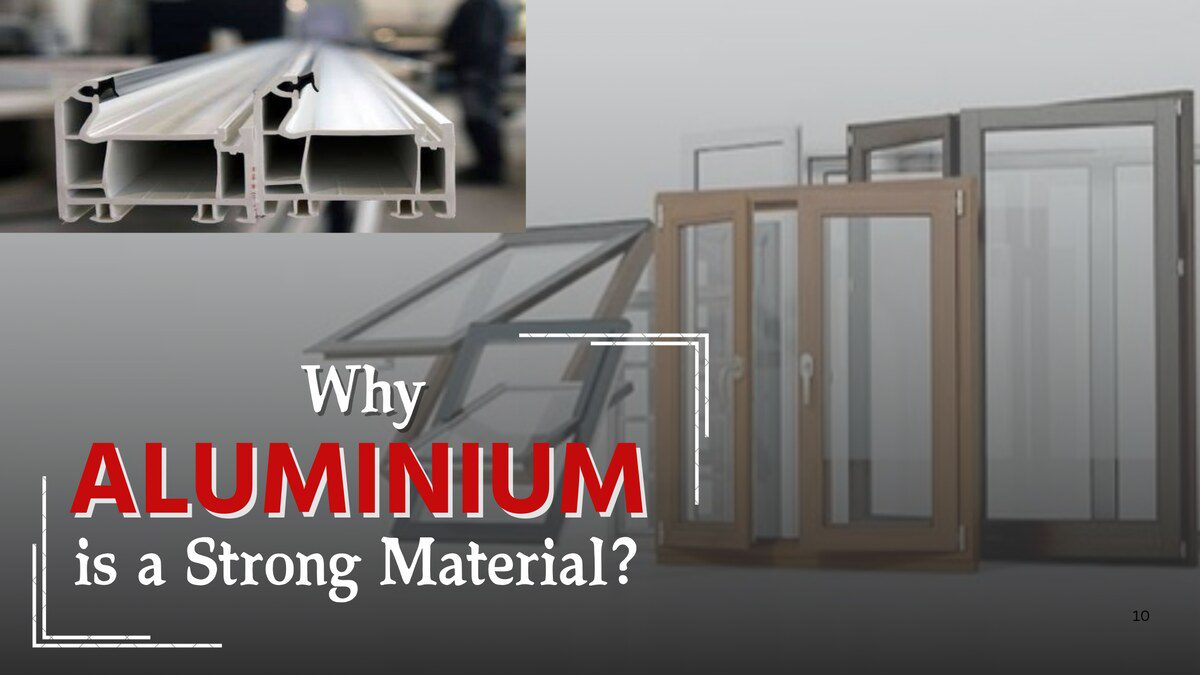
Modern Aluminum Windows: The Perfect Energy-Efficient Upgrade for Older Homes

Why Choose Aluminum Windows? A Comprehensive Guide
Why Is Aluminium a Strong Material? A Brief Guide to Its Benefits

When it comes to building materials that combine strength, versatility, and modern aesthetics, aluminum stands out as a top choice. Known for its impressive durability and lightweight properties, aluminum has become a staple in construction and design, from skyscrapers to everyday appliances.
But what exactly makes aluminum such a strong and reliable material? It has highly unique properties. Let us try to find out more information related to the strength of aluminum.
Strength of Aluminum: What Makes It Strong?
Let us explore the scientific reasons that make Aluminium one of the vital materials. In fact, there are several science-backed reasons that make the metal strong enough.
Atomic structure
Aluminium has a face-centered cubic (FCC) crystal structure. This makes it much more ductile in nature. That will make it easy to stretch without any breakage. Alloying is one of the techniques that makes it tough and strong. The addition of elements like copper, magnesium, silicon, and zinc makes it quite strong.
Oxide layer protection
When aluminum is exposed to air, it forms a protective layer of aluminum oxide on the surface. This will act as a barrier against corrosion and oxidation. This will further make the material more resilient to environmental factors. This is in sharp contrast to iron, which rusts and corrodes.
Low density and high strength-to-weight ratio
This is yet another reason that makes aluminum stronger. This is also the reason why it is used in areas where weight reduction is essential. In fact, aluminum offers significant weight reduction without compromising structural stability. This makes it a prime choice for the aerospace and automotive sectors.
Fundamental Properties that Make Aluminium Stronger
Well, that was about the chemical and material characteristics of Aluminium that make it strong. Apart from that, several other reasons make aluminum a more substantial material.
Aluminum durability
Some of the aluminum alloys offer a very high tensile strength of 500 MPa (megapascals) or more. That should make the metal a great choice for the materials that need better durability under tension. This can include aircraft frames and structural supports.
Fatigue resistance
In the case of repetitive loads, fatigue resistance assumes a lot of importance. Aluminum alloys are known for withstanding high repetitive loads. It can effectively handle cyclic stress without any cracks or fractures.
This property gives it the strength needed in applications like automotive suspensions and cycling frames. Thus, aluminum can withstand constant vibrations and stresses.
Corrosion resistance
Benefits of aluminum in construction is its corrosion resistance feature. Aluminium has a natural oxidation process. This makes it the best choice for self-healing. This property also gives it a corrosion-resistant surface. This is quite useful in marine environments or applications exposed to moisture and chemicals.
This is in contrast to the other materials that need constant maintenance, such as rust prevention. The aluminum, on the other hand, offers long-lasting performance with not much maintenance.
Malleability and Workability
If you are choosing aluminum for commercial projects then it is the best decision. Why? Because the strength of aluminum lies in its malleability. It can be shaped and molded without losing its strength. This assumes a lot of importance in applications like extrusion and forging. It also offers excellent workability and lets the manufacturers design lightweight yet strong components.
Thermal conductivity
The high thermal conductivity also contributes to the strength of aluminum. The metal does not retain the heat but dissipates it instantly. This can be a helpful feature where the components can be exposed to high heat.
This makes it an ideal choice for the manufacturing of engines, electrical systems, and heat exchangers. Aluminium can make itself the best option for maintaining strength and stability even when the temperature fluctuates to extreme levels.
Alloying – The key reason for the strength of aluminum
The key to the strength of aluminum lies in its alloying. It is typically alloyed with metals such as copper, magnesium, silicon, manganese, or zinc. This improves some inherent properties of aluminum.
Alloys are known to improve the tensile strength, hardness, and overall durability of aluminum. This will make it suitable for the components that require a high resilience.
There are several alloying materials used for increasing the strength of aluminum. They offer a wide range of options for enhancing the strength of aluminum.
- 2xxx series – These belong to the category of copper alloys. They have a high strength and excellent fatigue resistance. However, they may be less corrosion-resistant.
- 5xxx series – These alloys belong to Magnesium alloys. They have moderate to high strength and excellent corrosion resistance. They can be the right pick for marine applications.
- 6xxx series – These are the magnesium and silicon alloys. They offer an outstanding balance of strength, corrosion resistance, and workability. They are normally used in the construction and automotive industries.
- 7xxx series – They belong to the class of Zinc alloys. They are the strongest among the aluminum alloys. These are used in the aerospace industry. They can withstand a high stress.
Why Aluminum is the Strongest Choice for Windows?
Not only in the high-end industries that we mentioned above, but aluminum has also become the go-to option for modern and contemporary architecture. It offers a combination of strength, durability, and aesthetic versatility.
It can also provide you with resistance to warping and weathering. Windows are consistently exposed to changing weather conditions, which include rain, sunlight, wind, and temperature fluctuations. They stand out with their ability to maintain structural integrity under these conditions.
The unique combination of strength, flexibility, and resilience makes it the most robust and versatile material for windows. It can also support large glass expanses. The aluminum windows offer protection against harsh weather.
In addition, aluminum also provides an elegant aesthetics. These qualities make aluminum the top choice for architects, builders, and homeowners who prioritize both durability and design in their window solutions.
In Conclusion
Aluminium has earned a reputation for being the strongest among the metals. One of the primary factors that go in its favor would be the environmentally friendly nature of the material. The unique combination of lightweight properties, impressive strength-to-weight ratio, corrosion resistance, and malleability makes it indispensable across a wide range of industries.
It offers you access to a blend of strength, sustainability, and efficiency that few other materials can match.




